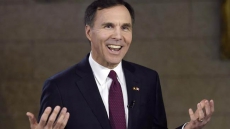VICTORIA — The prospect of billions of dollars in liquefied natural gas revenues has British Columbia's government preparing for a political and environmental juggling act as Premier John Horgan attempts to hold together his minority government while appeasing ever watchful climate guardians.
Horgan said LNG Canada's decision to build a $40 billion liquefied natural gas project in northern B.C. ranked on the historic scale of a "moon landing," emphasizing just how much the project means to an economically deprived region of the province.
Opposition Liberal Leader Andrew Wilkinson, former Liberal energy minister Rich Coleman and Skeena Liberal MLA Ellis Ross, a former Haisla Nation chief and early LNG backer in Kitimat, were present at the signing ceremony with Horgan, Prime Minister Justin Trudeau and representatives from the five international energy giants behind the LNG Canada project.
Green party Leader Andrew Weaver did not attend.
Weaver, whose three members of the Green party caucus have an agreement to support Horgan's New Democrat government, stood up in the legislature Tuesday and accused the NDP of being part of a "grand hypocrisy," for its criticism of past proposed LNG projects.
But Horgan was already setting in motion plans to bring the Greens, Liberals and environmentalists on side.
"Mr. Weaver has been very clear on his view on LNG and he can certainly speak for himself, but we are working, he and I and the government, on putting in place our climate action plan this fall and it will include LNG," he said in an interview after the LNG announcement.
Wilkinson's Liberals issued a statement saying they have supported LNG from the outset and are looking forward to backing any legislation concerning the Kitimat project.
The premier said during the news conference that his government will meet greenhouse gas reduction targets set by the federal government.
"It will be significantly challenging for all of us but with the revenue, some $23 billion coming to the province from this project, we will be able to innovate, work with renewables, work with Shell and the joint venture partners to bring down emissions over the long term."
Horgan also directed senior officials to hold a background briefing at the legislature on the government's plans to move LNG issues through the legislature and address climate goals.
The officials, speaking on a not-for-attribution basis, said no LNG legislation is coming this fall and a repeal of the former Liberal government's LNG income tax will not be tabled until the LNG Canada project is about to go into production by 2024.
A cabinet order was signed Tuesday, bypassing debate in the legislature and exempting the provincial sales tax during the construction phase of the project.
The officials said B.C.'s proposed climate plan will be designed to meet legislated targets to cut greenhouse gas emissions by 40 per cent by 2030, 60 per cent by 2040 and 80 per cent by 2050.
Much of the reductions will be achieved by B.C. moving towards electrification, primarily in the transportation and industrial sectors. The officials said the plan will offer industry rebates on carbon tax payments if they meet global clean-energy targets.
The officials said the LNG Canada project is forecast to emit 3.45 megatonnes of greenhouse gas emissions annually.
Clean energy advocate Pembina Institute said it is waiting to see how the government reconciles LNG's carbon pollution with its climate goals.
B.C. currently emits about 63 megatonnes of greenhouse gas emissions annually and its goal is to get that number down to about 13 megatonnes by 2050, said Karen Tam Wu, Pembina's B.C. managing director.
She said the province has a long way to get there, but Tuesday's LNG announcement and the coming climate plan set targets and the climate agenda.
"Now we have to really accelerate where and how we decarbonize the building sector, the transportation sector and of course, industry," she said. "The natural gas sector has some work to do as well."



